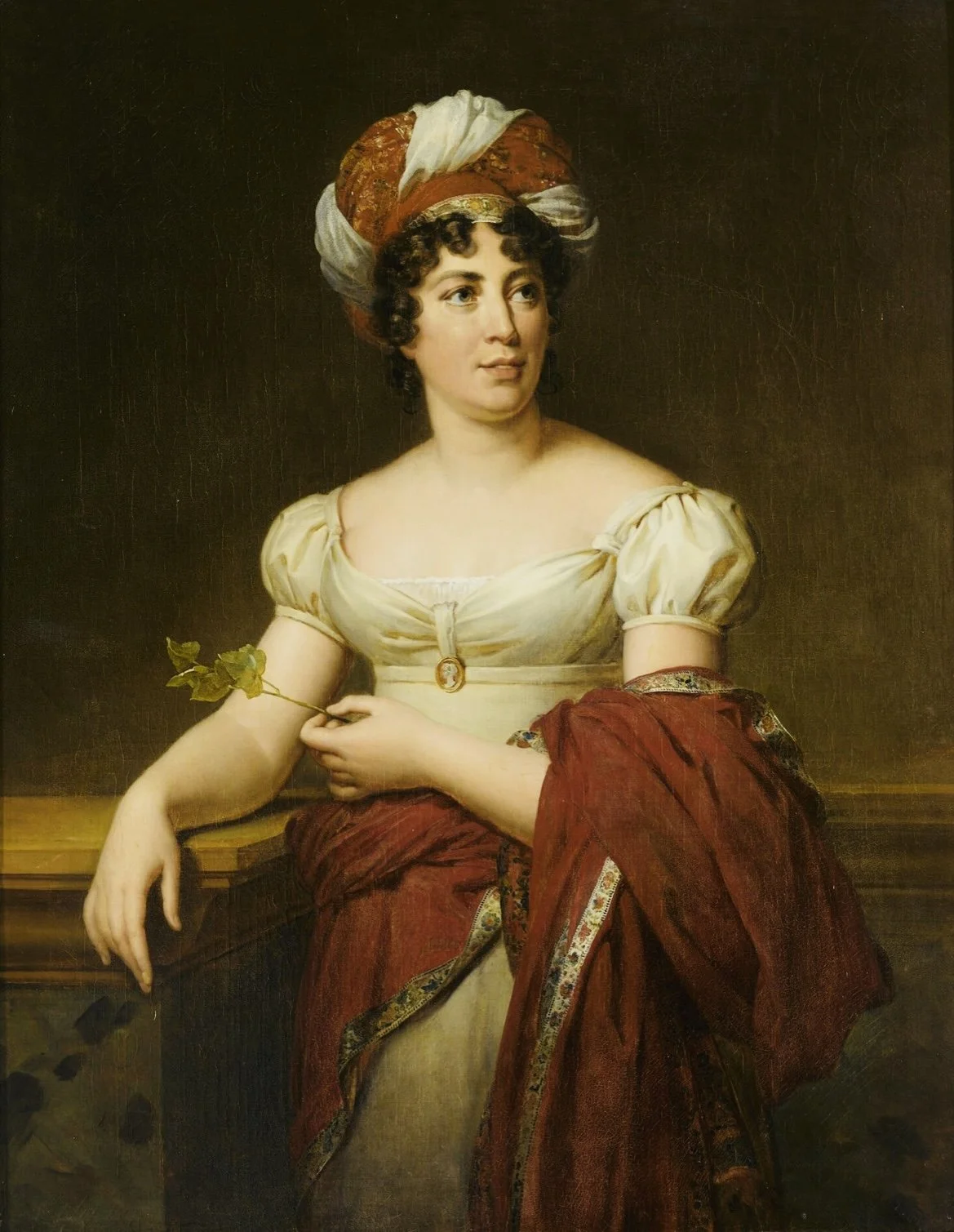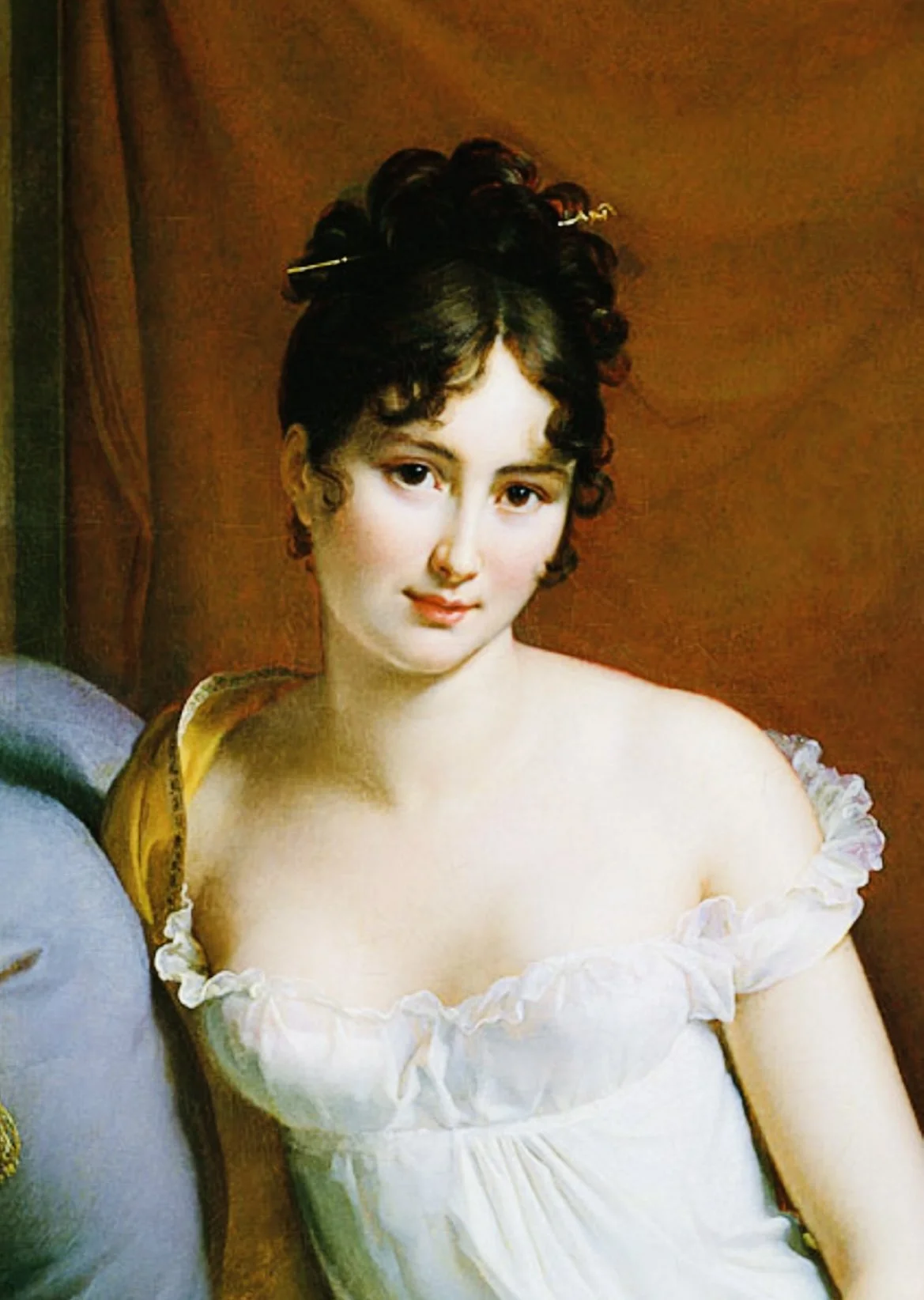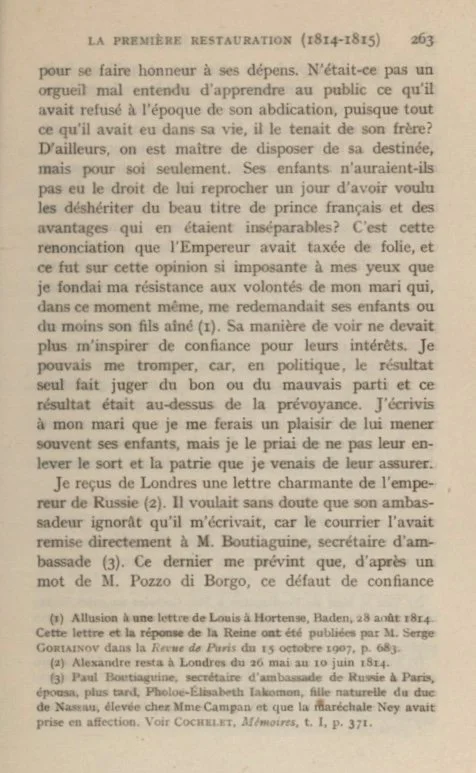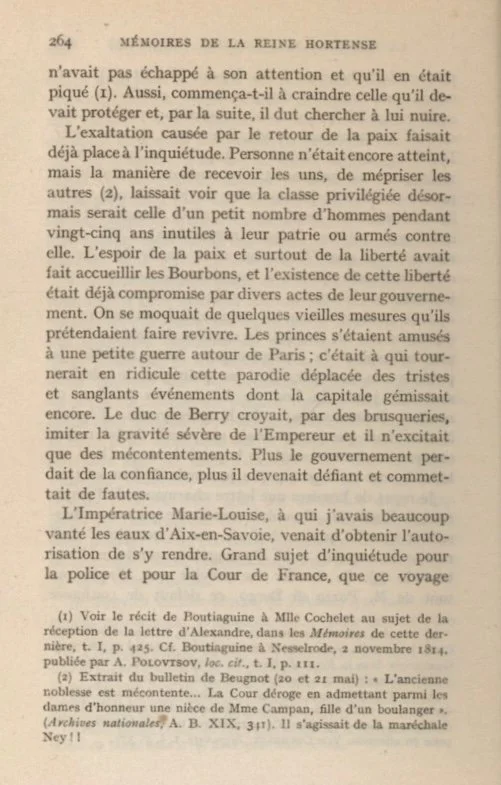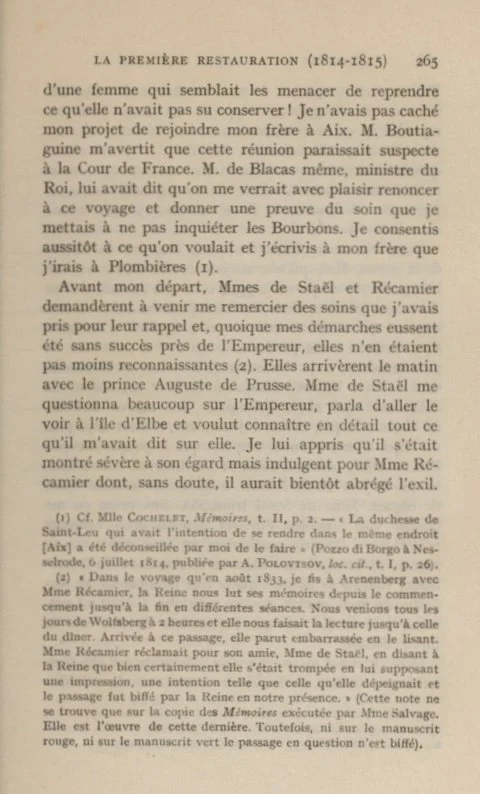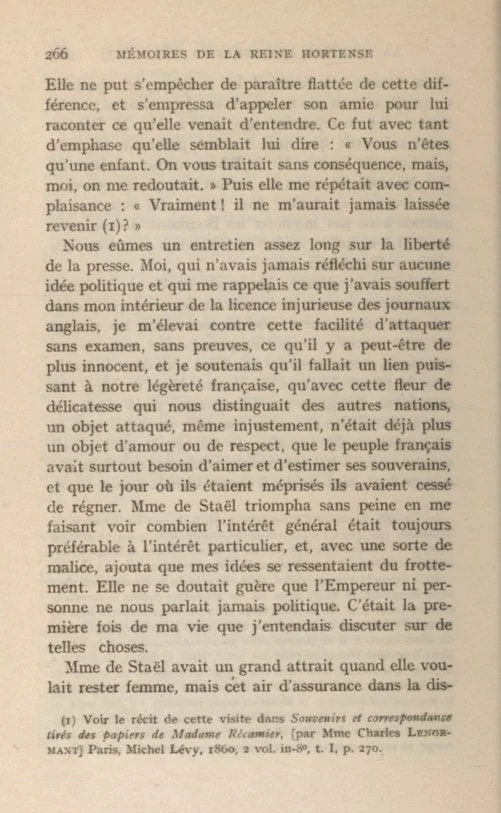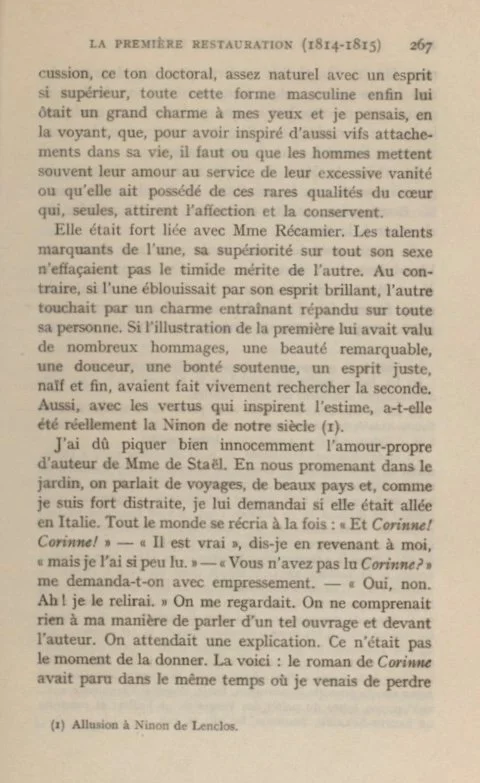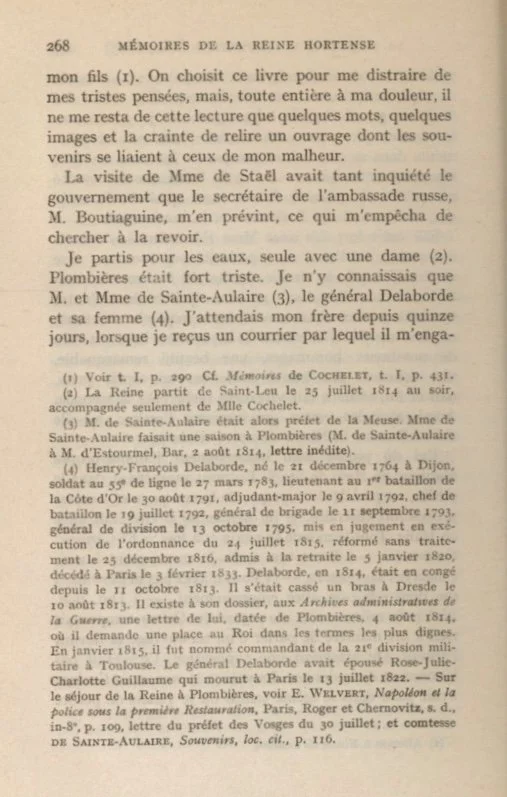Let’s have another look at Hortense’s Memoirs. If you want to read the book it is available for free at the side bar in English and French. Use the widget on the sidebar to translate the text below into pretty much any language.
Hortense describes what it’s like when a largely idle group feel they’re losing control over the public’s imagination. Hortense also describes her meeting with Madame de Staël and Madame Recamier, these were 2 highly esteemed women of their era. Hortense seems to be implying she thought they were lovers.
Hortense’s memoirs continues:
I wrote my husband that I should be pleased to take his children often to see him, but I begged him not to deprive them of the future and the nationality which I had won for them.
From London I received a charming letter written by the Emperor of Russia. He doubtless did not wish his ambassador to know that he was writing me for the dispatch had been placed directly in the hands of Monsieur Boutiaguine, secretary of the embassy.
The secretary warned me that, judging by a remark Monsieur Pozzo di Borgo had made, the ambassador had noticed this lack of confidence in him and had been offended by it. Thus, it came about that he first feared the person he was supposed to protect and later came to desire to harm her.
The enthusiasm aroused by the return of peace had given way to a general feeling of unrest. No one yet knew just what was the matter, but the manner in which some people were made much of at court and certain others were neglected showed that in future the privileged class would consist of a little group made up of the men who for twenty-five years had done nothing useful in behalf of their country, or who had even actively fought against her.
The promise of peace and especially of more liberal measures of government had caused the Bourbons to be welcomed, but already the prospect of such measures was threatened by various laws they had introduced. People made fun of certain old-fashioned customs that the government attempted to revive.
The princes had amused themselves by conducting mimic war just outside of Paris. This was considered an unseemly parody of the sad and sanguinary events from the effects of which the capital was still suffering. The Duc de Berry believed he could, by an air of petulant ill humor, imitate the Emperor's grave severity and he shocked people's feelings by his attitude.
The more the government felt it was losing the nation's confidence the more it became suspicious and the more mistakes it made.
I had praised the waters of Aix-en-Savoie highly to the Empress Marie Louise and she obtained permission to take a trip there. This greatly worried the police department and French court circles.
They felt themselves in peril on account of a journey undertaken by a woman who to them seemed threatening to recapture what she had not known how to keep. I had made no secret of my plan of meeting my brother at Aix. Monsieur Boutiaguine informed me that our presence there at the same time as the Empress appeared suspicious to the French court.
Even Monsieur de Blacas, one of the King's cabinet ministers, told me he would be pleased if I changed my plans and thus showed my desire not to make the Bourbons uneasy.
I willingly consented, and I wrote my brother that I was going to Plombières. Before I left, Madame de Staël and Madame Recamier asked to be allowed to call and thank me for my efforts to have their sentence of exile suspended.
Although the Emperor had not consented to my request, they were none the less grateful. They arrived one morning accompanied by Prince August of Prussia.
Madame de Staël asked me many questions about the Emperor, spoke of going to see him on the island of Elba, and wished to know in detail everything he had said about her. I told her that he had judged her severely, but had been more indulgent towards Madame Recamier, whose exile doubtless he would have shortly suspended. She could not conceal her satisfaction at the distinction he made and hastened to call her friend over to tell her what she had just heard. She repeated it with a great deal of emphasis as much as to say,
“You are nothing but a child. People did not consider that you mattered whereas they were afraid of me."
Then she turned to me and said complacently, "Really, you don't think he would have ever let me return to France?" We spoke for some time about the liberty of the press. I, who had never thought about political matters of any kind and who remembered how much I had suffered in my home-life from the license of insult displayed by the English newspapers, attacked this facility for condemning a person on insufficient evidence and for misrepresenting what might be entirely innocent and harmless.
I declared that it was necessary to have a certain power of control over the press on account of our national tendency to make fun of serious subjects. Our excessive appreciation of the ridiculous, which distinguished us from other nations, made us unable either to respect or to admire a person or idea which had been wittily pilloried even unjustly.
It was desirable that the French nation should both respect and admire its rulers, for the day they began to be looked at contemptuously their power was at an end. Madame de Staël easily refuted this, pointing out to me how much more important public welfare was than private interests. She maliciously added that it was clear my ideas were colored by personal experience.
She little suspected that neither the Emperor nor anyone else ever talked to us about politics. It was the first time in my life I had heard such subjects discussed in my presence. Madame de Staël possessed a great deal of charm when she managed to remain feminine, but her decided manner when arguing a point and her dogmatic attitude, natural enough in the case of such a superior mind, made her appear to me far less attractive than I had expected. When I looked at her, I thought that in order to have inspired as many passions as she had either men's love must often be a question of vanity or else she must be endowed with those rare spiritual gifts which alone inspire and preserve affection.
She was very intimate with Madame Recamier. Her fine brain and her mental superiority over the other members of her sex did not diminish the other woman's more timid, more elusive appeal. On the contrary, while Madame de Staël dazzled people by the brilliance of her intellect, her companion captivated them by her winning grace.
Although the distinguished air of Madame de Staël had scored many successes Madame Recamier possessed a remarkable beauty, a gentleness, a kindliness and a simple, direct and subtle common sense which also attracted many admirers.
Thus, possessing also those qualities which win men's respectful admiration she was really the Ninon de Lenclos of our day.
I must unconsciously have hurt the pride of authorship in Madame de Staël. As we walked about the garden we spoke of foreign travels and the beauties of other countries, and being very absent-minded I asked whether she had ever been to Italy.
Everybody at once exclaimed, "And 'Corinne’! Have you forgotten 'Corinne'?"
“Of course!" I exclaimed, realizing what I had said.
“But then I read so little of it."
“Do you mean to say you have not read 'Corinne'?" someone inquired anxiously.
“Yes ... No . . . That is to say, I must read it again." People looked at me. No one could understand my speaking of such a work in this manner and especially in front of the author.
An explanation was necessary. It did not seem an appropriate moment to make it.
This was what had occurred. The novel entitled "Corinne" appeared just after I had lost my son. The book was given me to distract me from my melancholy, but overwhelmed as I was with grief, I recalled only a few phrases, some descriptions, and felt a fear of rereading a volume the memory of which was connected with my misfortune.
Madame de Staël's visit made the government so uneasy that the secretary of the Russian Embassy, Monsieur Boutiaguine, informed me of the fact; and this was why I made no attempt to see her again.
The original French is available below:

